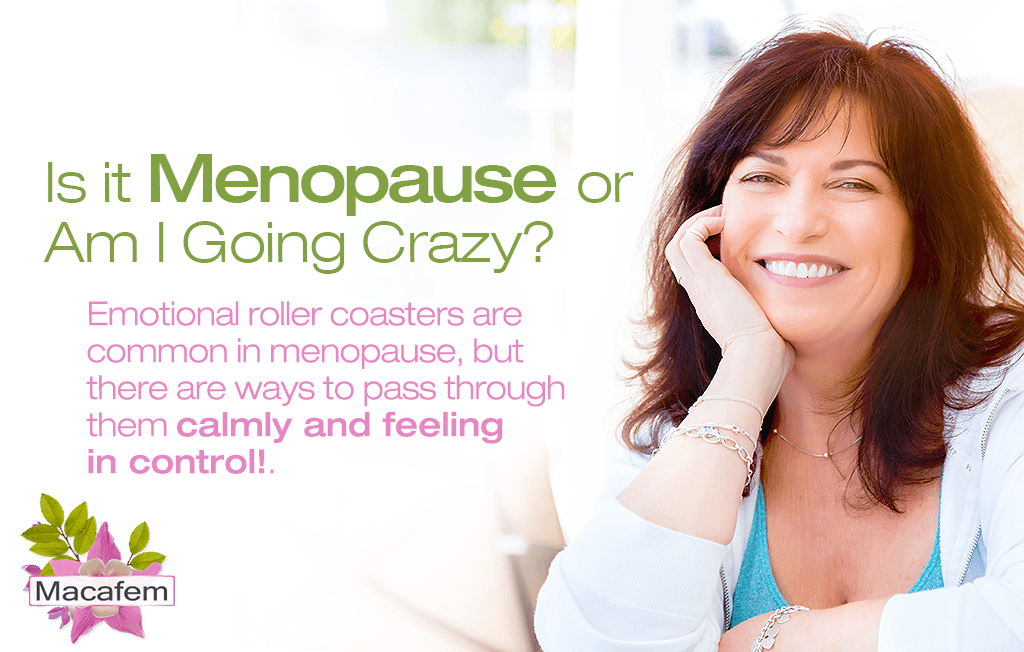Is it Menopause or Am I Going Crazy?
Many women going through menopause feel like they’re living in someone else’s skin. That is certainly true for those experiencing emotional rollercoasters that wreak havoc on their mental health. Continue reading about the four most common psychological symptoms of the menopausal transition and how to pass through them calmly and feeling in control.

Mood Swings
Abrupt and sudden mood swings are not novel for most women. After all, they are one of the most frequently experienced symptoms around monthly periods.
Menopausal mood swings are thought to be caused by erratic hormonal shifts that affect the production of mood-regulating neurotransmitters, such as serotonin. These rapid fluctuations can instantly put women on the edge only to find themselves crying helplessly moments later.
Irritability
Another emotional difficulty with which menopausal women often struggle is irritability. It can negatively affect how women spend their days, feel about themselves, show up at work, and maintain social bonds.
It is oftentimes described as the state of being annoyed by small things, frequently snapping at people around, and feeling angry and agitated. Similar to mood swings, irritability is also linked to fluctuating hormones as ovaries approach the end of their reproductive functions.
Anxiety & Panic Attacks
Anxiety disorders – which encompass several disorders like generalized anxiety disorder or panic disorder – may develop during the menopausal transition. Hormonal changes are also the most common culprit.
Panic disorder causes psychological and physical symptoms, such heart palpitations, rapid breathing, fear of drying, and paralyzing terror. Generalized anxiety disorder, on the other hand, is characterized by excessive and persistent worry. Untreated, both can turn women’s lives upside down.
Depression
If mood swings, irritability, and anxiety were not enough, menopausal women are also at an increased risk of developing depression. Those who have had depression in the past might be especially affected.
Besides frantic hormonal shifts, depressive episodes during menopause can also be triggered by a number of other factors. They include struggles to come to terms with their changing bodies, self-esteem, aging, loss of fertility, and the burden of physical symptoms they may experience along the way.
How to Cope with Psychological Menopause Symptoms
As with any ailment, the first step to finding relief is identifying the problem and making a decision to do something about it.
Luckily, there is an abundance of ways to start feeling better, including the following:
- Surrounding yourself with supportive people, especially other menopausal women going through similar difficulties, can make you feel like you’re not alone and you have someone to lean on.
- Maintaining open conversations with friends, family, and co-workers can help take the pressure off of you, allowing them to create a safe space for your needs.
- Dedicating time to hobbies, volunteer work, and other creative outlets can help you distract your mind from troubles on hand and see them from a more distant perspective.
- Staying physically active can bring calmness and order to the wandering mind. Consider taking your workouts outdoor, weather permitting, to enjoy the mood-boosting effects of sunlight.
- Undergoing psychotherapy, including cognitive-behavioral therapy (CBT), can equip you with concrete tools to manage and prevent episodes with more success.
- Balancing hormones with Macafem will help ease their debilitating effects on your mental health by naturally nourishing your endocrine glands with beneficial alkaloids.
Feeling overwhelmed with sudden, intense, and, oftentimes, new emotions in menopause can easily make you feel like you’re losing your mind. Yes, they’re common. But no, this doesn’t mean you have to hopelessly succumb to them. Start today, seek help, and go through this change in life feeling calm and in control.
Hormone Health Network. (2018). Menopause Mood Swings. Retrieved March 8, 2021 from https://www.hormone.org/diseases-and-conditions/menopause/menopause-mood-swings
Johns Hopkins Medicine. (2020). Can Menopause Cause Depression? Retrieved March 8, 2021 from https://www.hopkinsmedicine.org/health/wellness-and-prevention/can-menopause-cause-depression
The North American Menopause Society. (n.d.). Depression & Menopause. Retrieved March 8, 2021 from https://www.menopause.org/for-women/menopauseflashes/mental-health-at-menopause/depression-menopause

